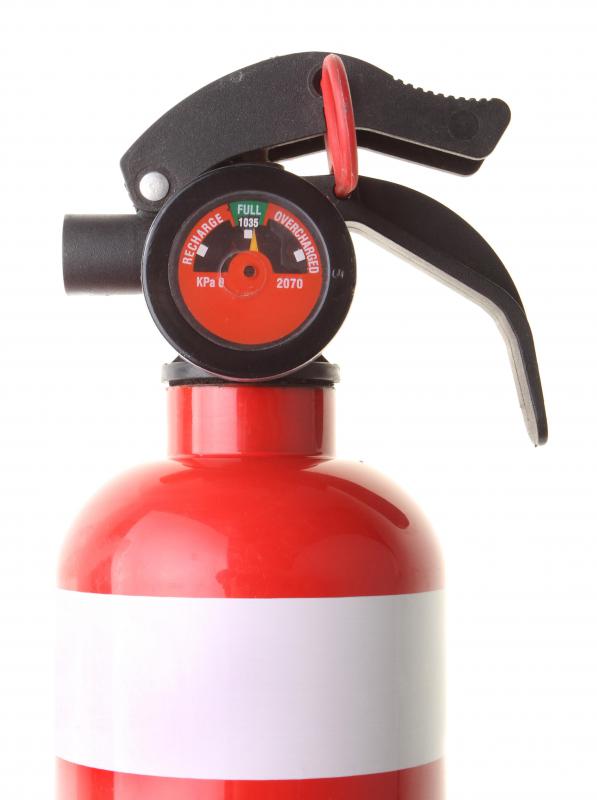At InfoBloom, we're committed to delivering accurate, trustworthy information. Our expert-authored content is rigorously fact-checked and sourced from credible authorities. Discover how we uphold the highest standards in providing you with reliable knowledge.
What is a Chemical Fire Extinguisher?
A chemical fire extinguisher is a fire extinguisher which is designed to inhibit the chemical reactions which allow a fire to persist and grow. These extinguishers can be found in use in a number of different settings, and are suitable for class A, B, and C fires. For example, many household fire extinguishers are chemical fire extinguishers.
These fire extinguishers contain pressurized chemicals which will disperse when the device is activated. A powder chemical fire extinguisher blasts out a powder, but there are also wet chemical extinguishers as well as foam extinguishers which spray out suspensions in foam or liquids. Some companies also make these extinguishers in the form of balls which are tossed into a fire; the heat causes the ball to break apart, releasing the chemicals.

Fire needs oxygen, heat, and fuel in order to form and persist. One way to address a fire is to remove one of these elements. In the case of a chemical fire extinguisher, the fire extinguisher doesn't actually remove oxygen, fuel, or heat, it just suppresses the chemical reactions between them, effectively shutting down the fire. In addition, since the chemical fire extinguisher usually coats the area with a layer of material, it inhibits reignition, allowing firefighting personnel to move in to secure the site.

These types of fire extinguishers are very easy to use, and safe in a range of settings. However, there are some precautions to be aware of. The first thing to know is that they can be extremely messy. A mess is better than a fire, but it can be a concern in some types of environment. The chemicals can also be corrosive, potentially causing damage to things like electronic components. Again, some damage is better than a fire, but in areas where corrosion damage is a worry, another type of fire extinguisher may be a more suitable safety product.

A chemical fire extinguisher will only work when it is well maintained. People should periodically have their fire extinguishers inspected, a service which is often offered free of charge at fire stations. Fire extinguishers also need to be replaced or recharged after use, ideally as quickly as possible, to ensure that an extinguisher will be available in the future when it is needed. It is also important for all of the residents or workers in a building to know where fire extinguishers are located and to be familiar with their operation.
AS FEATURED ON:
AS FEATURED ON:













Discuss this Article
Post your comments